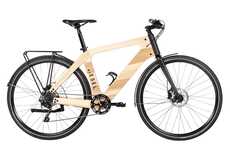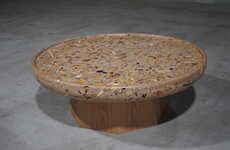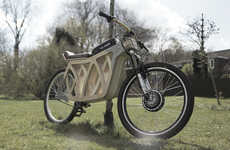
The Ekoa Material is a Sustainable and Stronger Replacement for Wood
Justin Lam — May 15, 2018 — Eco
References: lingrove & fastcompany
Lingrove's signature Ekoa material offers up a solution to replacing real-wood materials with something that is just as beautiful and even stronger than the real thing. Made using two carbon-negative materials: flax linen fiber and plant-based resin, the use of these bases not only gives the Ekoa material a sustainable aspect but also allows it to be incredibly moldable and lightweight.
Designed by Joe Luttwak, the sustainable material was first used as a means to produce high-performance non-wood guitars. While the initial designs featured carbon fiber, Luttwak wanted to find something more sustainable and began experimenting with new materials. This led to the creation of the Ekoa material which is now being used to create a variety of products. The new products made from Ekoa range from fishing rods to chairs, with the ultimate goal to replace wood as a material.
Designed by Joe Luttwak, the sustainable material was first used as a means to produce high-performance non-wood guitars. While the initial designs featured carbon fiber, Luttwak wanted to find something more sustainable and began experimenting with new materials. This led to the creation of the Ekoa material which is now being used to create a variety of products. The new products made from Ekoa range from fishing rods to chairs, with the ultimate goal to replace wood as a material.
Trend Themes
1. Sustainable Wood Alternatives - The trend of seeking sustainable wood alternatives is driven by the need for more environmentally friendly materials in various industries.
2. Carbon-negative Materials - The trend of using carbon-negative materials like flax linen fiber and plant-based resin presents opportunities for disrupting traditional material manufacturing processes.
3. High-performance Non-wood Products - The trend of developing high-performance non-wood products, such as guitars and furniture, showcases the demand for innovative and sustainable materials in the market.
Industry Implications
1. Furniture - The furniture industry can explore the use of sustainable wood alternatives like Ekoa material to create eco-friendly and durable products.
2. Musical Instruments - The musical instrument industry can embrace carbon-negative materials to produce high-performance instruments that are both sustainable and have superior qualities compared to traditional wood-based instruments.
3. Sporting Goods - The sporting goods industry can benefit from the development of carbon-negative materials to create lightweight, moldable, and durable products like fishing rods made from Ekoa material.
4.2
Score
Popularity
Activity
Freshness























